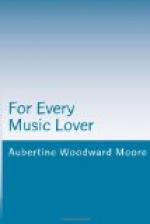It is an absurd error to suppose that fine soloists cannot succeed in ensemble work, or as accompanists. Those who fail have been poorly grounded in their art. They may give dazzling performances of works bristling with technical difficulties, yet make a sad failure of some slow, tender movement that calls for musicianly understanding and delicate treatment. The truth is, the requirements for an artistic accompanist, or for artistic concerted work, are the same as for an artistic soloist: well directed musical aptitude, love of art, an ear attuned to listening and large experience in sight-reading.
The music pupils’ public recital contributes no little to the blunders of the day in music study. Especially with piano pupils, the work of the year is likely to be shaped with reference to the supreme occasion when results attained may be exhibited in the presence of assembled parents and friends. The popular demand being for the mastery of technique, showy pieces are prepared whose mechanism so claims the attention that the principles underlying both technics and interpretation are neglected. Well-controlled hands, fingers, wrists and arms, with excellent manipulation of the keyboard, may be admired at the recital, but little of that effective playing is heard which finds its way to the hearer’s heart. A dead monotony will too often recall the letter that killeth because devoid of the spirit that giveth life.
Sounding notes, even sounding them smoothly, clearly, and rapidly, is not necessarily making music, and a succession of them without warmth and coloring is truly as inartistic as painting without shading. If it were more commonly realized that it is an essential part of the music teacher’s vocation to train the mind and the emotions and through them the will and the character, there would be a higher standard for the music pupils’ recital. No one would be permitted to play, or sing in public who could not give an artistic, as well as a technically correct performance.
Music students should lose no opportunity to hear the best music, both vocal and instrumental. Heard with understanding ears one good concert is often worth a dozen lessons, yet many students know nothing in music beyond what they have practiced themselves, or heard their fellow-students give at rehearsals or recitals. If they attend concerts at all, it is rather to observe some schoolmaster method in their own particular branch than actually to enjoy music. Trying to gain a musical education without a wide acquaintance with the literature of music is like attempting to form literary taste without knowing the world’s great books. To bathe in the glow of the mighty masterpieces of genius neutralizes much that is evil. In music they are the only authoritative illustrations between notes and the ideals they represent; they form the models and maxims by means of which we approach a knowledge of music.




